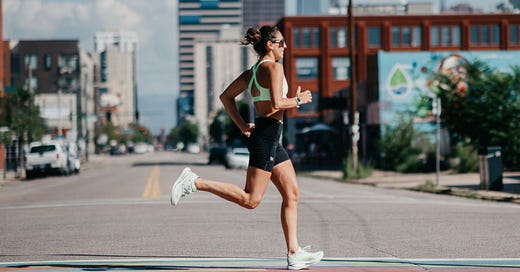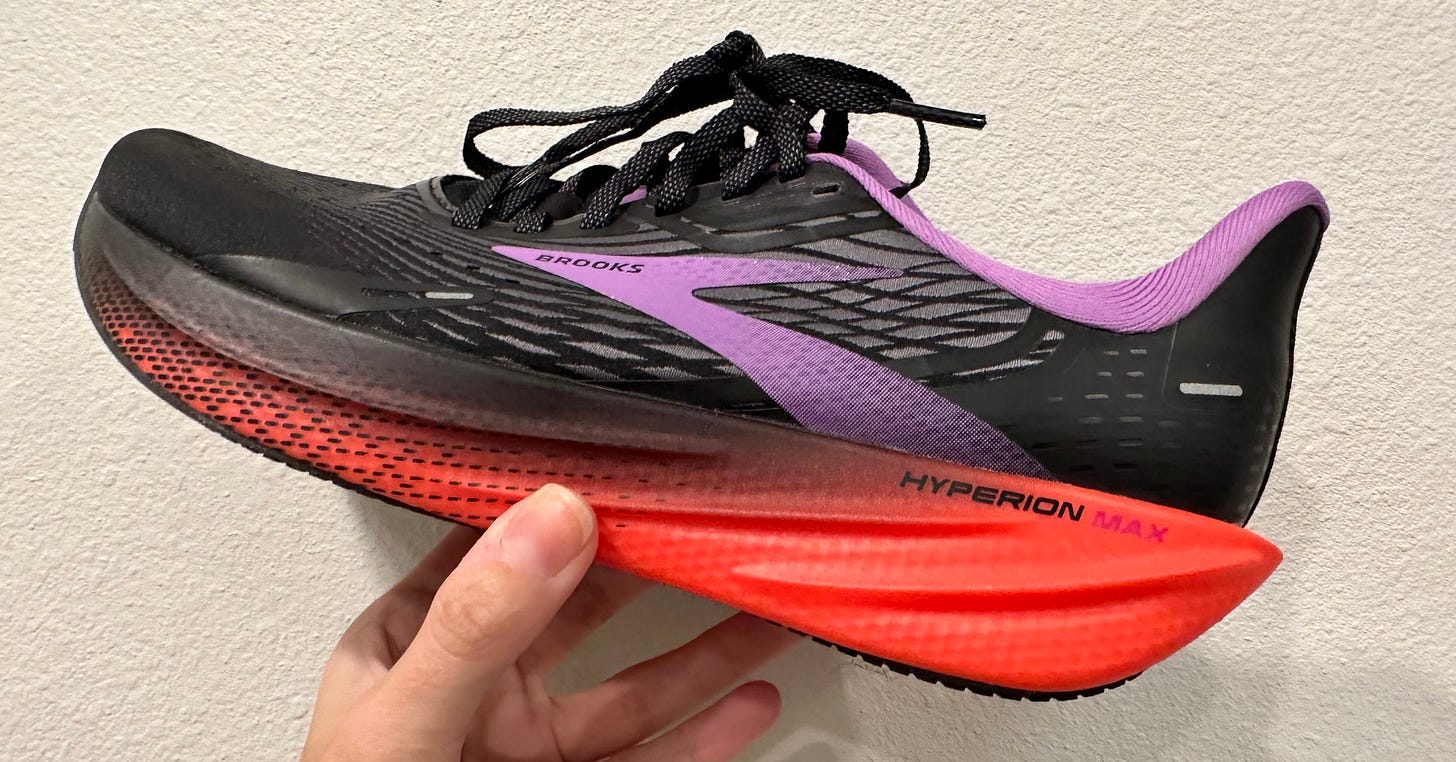How to Set Goals You Can Actually Achieve
A new year is a fresh start. What will you do with yours?
Happy New Year! It’s that time when everyone on the planet (or at least social media) posts about goals and resolutions and how to achieve them or stick to them. It’s a lot—but I’m going to add my two cents anyway. (For the record, I love the idea of a fresh start at the new year, buuut I think that mentality can also apply to the first of a month, or even just a Monday.)
Since we’re here to talk about running…this sport is inherently goal-driven, especially at the beginning. First, it’s about running a certain distance. Then it’s about running that distance within a certain time. And then it’s about running that distance faster than the time before…and so on and so on. But—I say this from personal experience—that quantifiable approach can take some of the nuance out of goal-setting.
I spent a lot of 2022 fixated on running a marathon in a certain time, and I think it ended up being a sort of self-sabotage. Case in point: I ran a PR in May, and I was so disappointed I missed my “real” goal that I couldn’t appreciate the gains that I had made. Then I ran two more marathons, both of which required some serious mental gymnastics so I wouldn’t finish with that same perspective.
This year, for me, brought about some seismic shifts in how I approach goal-setting. Achieving a goal is such a fleeting feeling, and I want more than that going forward. If you’re still figuring out what you want out of 2023, I hope that these three things I’ve learned can help.
Reconnect to your ‘why’.
I was at mile eight of the 2022 Berlin Marathon when I realized I absolutely did not want to be there. I had signed up for that race solely because I wanted the Tracksmith finish time poster (it was missing from my collection, OK?), but my training was going so well that I got totally caught up in the potential for a PR. When I set out at goal race pace, though, I was running alone, I only had two spectators I knew waiting somewhere along the 26.2-mile course, and I understood that chasing a PR that day was eventually going to require some serious suffering—and nothing about that scenario motivated me.
A couple weeks later, Nike coach Jes Woods shared a quote from 800-meter athlete Raevyn Rogers that summed up what went so wrong with me, mentally, in that race: “If you run *trying* to hit a PR, the PR is *not* going to happen. Personal records and personal bests just… happen, but never when they are the *only* goal. They happen when you’re feeling good at the starting line and then run (race) at your full potential.”
Woof. I hadn’t felt good at the start line, because I had put so much pressure on my potential finish time that it sucked all the joy out of being there, and I was dealing with a certain level of fear around what would happen if I didn’t achieve it. (Spoiler alert: Nothing. Because no one, except you, cares about your finish time). I thought running a certain time would make me happy, and forgot that what actually makes me happy is feeling strong enough to see what I’m capable of and sharing that experience with friends. I wish that I had gone into that race with the goal of having fun—because I know when I’m enjoying myself, I’m capable of so much more than when I’m coming from a place of fear and anxiety.
Set minimum expectations.
When I realized I wasn’t in the right headspace to go after my time goal in Berlin, my kneejerk reaction was to quit (for the record, I didn’t, and I did get the Tracksmith poster). After the race, I was reading Steve Magness’ Do Hard Things and came across this bit:
“Instead of going all in for the massive breakthrough, [Brian Barraza, a professional runner] sets a minimum expectation. ‘When you raise the floor, it allows for those days when everything is clicking to exceed expectations.’ … Instead of aiming for our best performance, something that we can only accomplish rarely, shoot for improving your best average.”
That totally changed the way I viewed that race. When I reconsidered my time, I realized I had run the course 16 minutes faster than I had in 2018. That’s huge! I may not have achieved my goal at that moment, but I was making progress over time—a big picture goal that’s way more important than a single race.
Setting minimum expectations isn’t about lowering your expectations, Magness wrote, it’s about developing enough confidence to know you can consistently achieve a certain standard—and then, when all the stars align, you can blow that standard out of the water.
Make your goals about the journey, not the end point.
After Berlin, I promised myself I’d stop obsessing over finish times and instead put my mental energy towards the process: making my easy runs easy; carving out time in my schedule for consistent strength training and mobility; prioritizing a healthier diet (with the exception of mozzarella sticks); etc.
TBH, these things can feel tedious to me. But you can’t achieve a big goal without knocking out a hundred small goals in the process. James Clear talks about this in his book Atomic Habits, which I haven’t quite finished yet. But I loved this part early on:
“Achieving a goal only changes your life for the moment. When you solve problems at the results level, you only solve them temporarily. In order to improve for good, you need to solve problems at the systems level. Fix the inputs and the outputs will solve themselves. … The purpose of setting goals is to win the game, the purpose of building systems is to continue playing the game. … It is your commitment to the process that will determine your progress.”
The habits I view as “tedious” actually lay the groundwork for the bigger goal, which is improving over time. I can’t run faster if I’m not recovered, if my body isn’t strong or mobile enough to support a certain pace, if I’m underfueled. There are so many uncontrollable variables that can affect your finish time in a race. Focusing on the journey to the end goal allows you to control what you can—and shapes you into a more well-rounded runner, making a future PR more likely.
the rundown
Brooks Hyperion Max
My favorite Brooks shoe of late has been the Hyperion Elite 3, and I had hoped the Hyperion Max would be a maximal version of that racer—à la the New Balance FuelCell SuperComp Trainer or the Adidas Adizero Prime X Strung. After my initial run, though, “max” felt like the wrong word. Yes, it’s super lightweight (courtesy of a nitrogen-infused DNA Flash midsole), but the stack height doesn’t even come close to that of other super shoes and I didn’t feel the same bounce or protective benefits on my lower legs. I did like it! It just wasn’t what I expected, and I’d reserve this shoe for speedy workouts or short, casual runs—not long runs or race day.
James Clear: Building & Changing Habits, The Peter Attia Drive
I mentioned James Clear’s book Atomic Habits above, and if you haven’t read it yet, this podcast is basically the CliffNotes version—with the bonus of additional insights and explanations from the author. It originally aired in December 2021, but I came across it this week and found it to be so helpful as I started thinking about the new year. As someone who really struggles with embracing certain habits I know will benefit me, I especially appreciated the clear (lol get it), actionable advice Clear gave for making or breaking habits.
Janji Atlas Tech Pant
When I first got these, I wasn’t sure what to do with them—I don’t really wear joggers and I couldn’t figure out how you could call these “winter” pants. Then I wore them, and now I love them. They’re actually meant to be layered—the four-way stretch fabric, ankle zips, and tapered design make it easy to pull them on over tights or shorts mid-run. In my case, I wore them to the gym to lift and was surprised by how much I liked that roomier fit. Plus, the reflective mountain pattern is super on-brand for CO. Sold!
Does Running Have a Drinking Problem?
This was a great Runner’s World article from A.C. Shilton. I’ve been slowly curtailing the amount I drink (TBH, I much prefer a soda to a beer after a run), and it hasn’t affected my social life around running at all. Shilton breaks down all the ways in which alcohol affects your recovery, sleep, motivation, and so on. TL;DR: There’s no such thing as “healthy drinking.” My takeaway wasn’t that everyone needs to avoid alcohol at all times, though; it was more that even light social drinking has a clear effect on performance—and if your goal is to perform at 100 percent, you might want to rethink your drinking habits.








Another great one - your discussion around letting go of the focus on a specific time really resonated with me. Thanks!